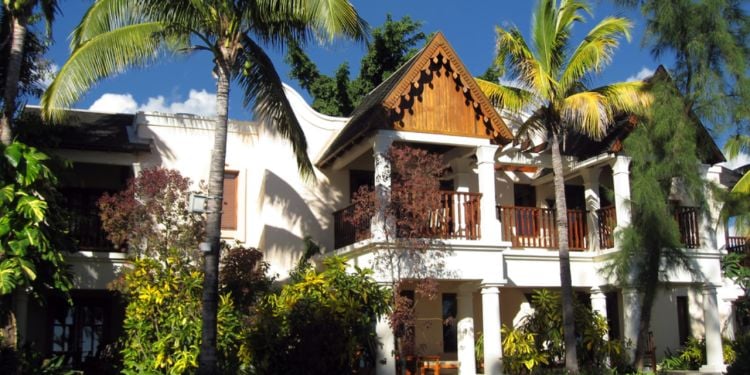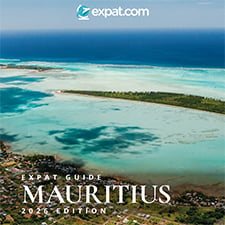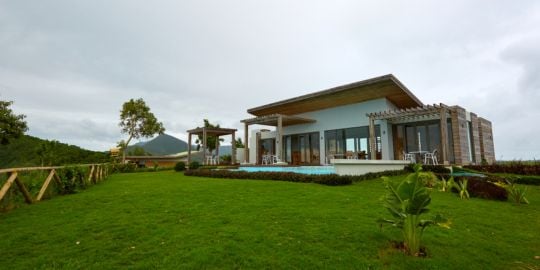How to buy a property in Mauritius

The Economic Development Board reminds us that any non-citizen, whether an individual or an investor, is allowed to hold/buy/acquire real estate in Mauritius. So if you're looking to become a homeowner in Mauritius, here's what you need to know.
Who can buy a property in Mauritius?
The following are authorized to buy a VEFA, IRS, RES, PDS, SCS, G 2, IHS property in Mauritius:
- Foreign nationals;
- Any person of Mauritian nationality;
- Companies incorporated or registered under the Companies Act 2001;
- Civil companies governed by the Mauritian Civil Code, whose articles of association have been filed with the Registrar of Companies in Mauritius;
- Limited partnerships governed by the Limited Partnership Act;
- Trusts where at least one of the trustees is a Qualified Trustee by virtue of a license issued by the Financial Services Commission of Mauritius;
- Foundations governed by the Foundations Act.
Property acquisition for foreigners in Mauritius
In the case of an individual, the acquisition of property requires the approval of the Prime Minister's Office (PMO).
In the case of an investor, the acquisition of property requires the approval of the Economic Development Board (EDB).
For this purpose, various schemes for the acquisition of residential property approved and administered by the Economic Development Board have been developed.
Important:
All new IRS and Real Estate Scheme (RES) residential projects open to foreign investors in Mauritius are now grouped under the Property Development Scheme (PDS). Consequently, any property marketed under the PDS / IRS and RES names is subject to the following purchase formalities, even if the IRS and RES names are still in use.
The EDB has created a complete guide on the purchase of real estate in IRS / RES and PDS in Mauritius.
The VEFA (Sale in Future State of Completion)
The VEFA in Mauritius (Vente en État Futur d'Achèvement), also known as off-plan purchase, is governed by articles 1601 and following of the Mauritian Civil Code (based on the Napoleonic Code) and must be the subject of a notarial act.
All IRS, RES and PDS can be acquired under VEFA. This type of program consists in buying a property that has not yet been built, that is under construction, or for which the developer guarantees the buyer a delivery after completion. In order to have an idea of the result, the buyer is given by the developer the plans, the diagrams relating to the real estate project to come.
It is also up to the developer to take all the steps required by law to obtain the building permit, take out the relevant insurance, monitor the work, etc.
Who can be interested?
The VEFA is intended for both Mauritians and expatriates. However, the latter have several advantages thanks to the real estate investment in Mauritius. Indeed, the Sale in Future State of Completion allows them to :
- Participate in the design of their property (interior design);
- Pay for their purchase in installments;
- Apply for a Resident Permit for themselves and their immediate family for any purchase of $375,000 or more.
Formalities to be completed for buying property in Mauritius
The purchase of a property in Mauritius includes the following steps:
- Signature of the reservation contract;
- The security deposit;
- The notarial deed;
- The final sales contract, established by a notary;
- The delivery of a property;
- The completion guarantees.
Signature of the reservation contract and deposit.
The buyer and the developer sign a contract confirming the reservation of the property to come. In the absence of a reservation contract, the developer can proceed directly to the final sales contract.
What the reservation contract must contain
The document must clearly mention the following:
- The type of property;
- Its description;
- The sale price and, if applicable, the conditions for its revision;
- The date of conclusion of the final contract;
- The deadline for the implementation of the work;
- The legal conditions of renunciation of the purchase by the buyer, with the recovery of the deposit;
- The suspensive condition of financing if the buyer wishes to resort to a real estate loan.
The security deposit
Following the signature of the reservation contract, the buyer deposits a deposit, which represents 2 to 25% of the value of the property, on an escrow account opened in the name of the buyer at a notary's office, or in a financial institution. Be careful; this deposit must be paid only when both parties have signed the reservation contract!
In case of non-realization of the real estate project, the promoter must obligatorily return this deposit to the purchaser. If the buyer decides not to buy, he/she must respect certain conditions to get his/her deposit back.
When the buyer signs the preliminary reservation contract in order to reserve his property under the VEFA, he is required to pay a deposit into a special account opened through the notary. Until the conclusion of the sales contract, this sum remains untouchable unless the VEFA does not materialize.
The notarial act
The deed of sale in the future state of completion is established by a notary. The Mauritian civil code provides for the content of the document as follows
- Exact and detailed description of the property in VEFA ;
- Date of completion of the construction
- Delivery date expressed in months, with late penalties in case of overrun
- Financial guarantees of completion of the works and/or reimbursement and construction insurance
- Mention of administrative authorizations (building permit...)
- Price of the real estate
- Schedule of payments.
- The final sales contract, drawn up by a notary.
One month before the signing, the notary issues the contract, equivalent to a title deed. It indicates the rights and obligations of the buyer towards the seller - the precise and final description of the property.
Delivery of the property
This is when the developer hands over the keys to the buyer. This stage marks the activation of the obligatory biennial and decennial guarantees:
- Guarantee of perfect completion (article 1642-1 and 1648 al. 2)
- Guarantee of proper functioning of the separable equipment elements (article 1646-1 and article 1792 of the Civil Code on biennial guarantees)
- Decennial guarantee (article 1646-1 and article 1792 of the Civil Code)
Although the buyer can accept the result without reservation, he can claim the guarantee of perfect completion during the year following the reception. This is if he notices, for example, defects.
If the purchaser has reservations upon acceptance of the work, he is entitled to ask the developer to remedy them and to resume the work within a period agreed upon.
Completion guarantee
To protect the purchaser of a property intended to be lived in, the developer is obliged to provide him with
-
A completion guarantee or financial completion guarantee (known as "GFA"): a bank guarantee through which a financial institution undertakes to advance the sums required for the completion of the work, in the event of default by the developer. The financial guarantee of completion allows the building to be completed without cancelling the sale.
or
-
A reimbursement guarantee: which allows the reimbursement by a financial organization of the sums already paid by the purchaser in case of non completion. The activation of this guarantee cancels the sale.
The guarantees of a VEFA construction
By choosing the VEFA, the buyer is protected by a series of guarantees:
- Functioning of the equipment, optional guarantee, valid for 2 years. It covers all equipment that can be separated from the construction (shutters, taps, etc.).
- The ten-year warranty or "warranty against hidden defects". Thanks to this guarantee, the buyer has 10 years from the date of delivery of the property to report and repair any defects that affect the solidity of the building (foundations, roof, etc.)
- Damage insurance, contracted by the developer for immediate coverage by the insurer of work related to the ten-year warranty. It is valid for the entire duration of the guarantee.
Staggered payments for a VEFA property:
- 25% of the sale price upon signature of the sales contract;
- 10 % on completion of the foundation work;
- 35% upon completion of the roof;
- 25% upon completion of the work;
- 5% on delivery.
The Integrated Resort Scheme (IRS)
Introduced in 2001 by the Mauritian government and regulated by the EDB, the IRS program benefits mainly large sugar companies. It offers properties located in settings generously equipped for leisure, entertainment and wellness, such as golf courses, marinas, beach clubs, pavilions and wellness centers surrounding the residences.
Through this program, non-residents can purchase villas, townhouses, penthouses, duplex apartments, serviced lots (maximum size of 1.25 A or 5,276 m²). They and their dependents can obtain a residence permit with a minimum investment of USD 375,000.
Owners are allowed to rent the property, become tax residents in Mauritius and freely repatriate funds or income from the sale or rental of the property. Finally, non-citizens holding a residence permit under IRS are exempted from an occupation or work permit to invest and work in Mauritius.
Who may be interested?
Mauritius has designed the Integrated Resort Scheme (IRS) to attract high-income foreigners in particular by offering them the opportunity to invest in luxury villas.
Formalities to be completed to invest in the IRS in Mauritius
Non-citizens, citizens, companies, corporations or trusts wishing to acquire a property under the IRS scheme must comply with the following steps:
- Sign a reservation contract with the seller (the property developer or owner);
- The developer submits the IRS acquisition form to the EDB of Mauritius;
- Upon receipt of the approval letter from the EDB, both the buyer and the seller must draw up the sales contract and the deed must be signed before a local notary.
The Real Estate Scheme (RES)
The Real Estate Scheme (RES) was established in 2007. The basis of the scheme is to encourage owners of small plots of land to build more affordable and less restrictive projects.
All RES projects must consist of a minimum of 6 high-end residential units, be developed on 1 to 24 acres of freehold land (less than 10 hectares) and provide the opportunity to purchase smaller properties.
If an IRS property is sold for a minimum of $375,000, the RES is not subject to a minimum sale amount. In return, the buyer is not automatically eligible for the Resident Permit unless he invests at least $375,000. He can rent the property, become a tax resident in Mauritius and freely repatriate the funds or income from the sale or rental of the property.
Non-citizens who have a residence permit under the RES will be exempted from an occupation or work permit to invest and work in Mauritius.
Who can be interested?
The Real Estate Scheme (RES) is aimed at foreigners with a limited budget who wish to live in Mauritius for a maximum of 6 months while having a home base.
Formalities to be completed to invest in the RES in Mauritius
Non-citizens, citizens, companies or trusts wishing to acquire a property under the RES scheme must comply with the following steps :
- Sign a reservation contract with the seller (the property developer or owner);
- The developer submits the RES acquisition form to the EDB of Mauritius;
- Upon receipt of the approval letter from the EDB, both the buyer and the seller must draw up the sales contract and the deed must be signed before a local notary.
Smart City Scheme (SCS)
The Smart City Scheme (SCS) was designed by the government to promote Mauritius as an international business center and encourage sustainable development. As a result, each smart city :
- Is built on a land area of over 21.105 hectares;
- Provides residential properties, commercial facilities and recreational amenities;
- Is optimized for energy efficiency;
- Is accessible to retirees, who can acquire life rights;
- Equipped with affordable housing units for middle-income earners;
- Open to Mauritian citizens and persons registered with the Mauritian Diaspora Scheme (at least 25% of residential properties);
- Allows Smart City companies and developers to sell land for residential and non-residential purposes;
- Has a company dedicated to smart management of common areas.
- Benefits of investing in a Smart City program in Mauritius as an individual:
- Allows foreigners to apply for Resident permit for any investment equal to or greater than USD 500,000 in real estate;
- Allows foreigners to purchase office space in Mauritius;
- Offers a wide range of tax and non-tax benefits to purchasers.
Exemptions by investing in the development and/or components of a Smart City in Mauritius for companies:
- Income tax for a period of 8 years;
- VAT on capital goods;
- Customs duties on the import or purchase of dutiable goods;
- Real estate transfer tax and registration tax on land transfer;
- Land conversion tax on the area allocated to the development of non-residential components;
- Subdivision tax.
Who may be interested?
- A foreigner who wishes to buy a townhouse, a villa, an apartment, a penthouse or a duplex in Mauritius.
- A foreigner wishing to have the Resident Permit through real estate investment (minimum amount of 375 000 USD) and who wishes to be able to rent and resell without any fees.
- Companies looking for a favorable and sustainable tax environment.
The Ground 2 (G 2)
Located in a condominium and in a building with at least 2 floors, the G 2 apartment refers to a property that is at least 2 floors above the first floor.
As announced in the 2021/22 budget and in accordance with section 5(1)(ga) of the Immigration Act, a residence permit is now granted to a non-citizen upon acquisition of residential property in a building of at least 2 floors above the first floor for an amount not less than USD 375,000 or its equivalent in any other freely convertible foreign or Mauritian currency.
The residence permit is valid as long as the non-citizen remains the owner of the residential property under the G 2 scheme.
Who can be interested?
The G 2 apartment can be sold off-plan, during or after its construction, but also, and more importantly, outside of the residential schemes mentioned above. Indeed, foreigners are now allowed to buy apartments in developments outside the approved residential programs.
The EDB also reminds that holders of a permanent residence permit and a professional earning more than USD 3,000 per month are allowed to buy a G 2 apartment as their personal residence.
The formalities to be respected to buy a G 2 apartment in Mauritius
To be eligible for the G 2 program, the purchaser must meet the following requirements:
- The apartment must be used according to the terms indicated on the purchase authorization;
- The owner is not allowed to transfer or assign the apartment without the authorization of the EDB;
- The owner is not allowed to practice real estate speculation for 6 months;
- This type of property is subject to property taxes and duties calculated on its current market value;
- Any resale (with no minimum price) or transfer must be requested in writing to the EDB 30 days before the sale or transfer.
The Invest-Hotel Scheme (IHS)
The IHS program, created in 2010, allows hotels to sell their rooms, suites, or villas that are part of the hotel to buyers before, during or after the construction of the hotel.
According to the EDB, the Invest Hotel Scheme (IHS) allows foreign investors and individuals to own exclusive hotel units located in Mauritius.
A non-citizen can acquire a room (or hotel unit) in new and existing hotels that are approved under the IHS. The said room is marketed with a co-ownership regulation governed by the Mauritian Civil Code. In case of a sale off-plan, the sale is made under the VEFA system, governed by the Mauritian Civil Code.
The owner has privileged access to all the amenities of these highly equipped luxury hotels, including ancillary services such as dining, full-service spas, fitness centers and swimming pools integrated into these resorts.
The unit owner or anyone on their behalf can enjoy the unit for up to 45 days in a 12-month period, and can also earn income through the sale-leaseback model.
If the unit or room is acquired for a minimum of USD 375,000, the owner would become eligible for a residency permit.
Who may be interested?
- A non-citizen of Mauritius;
- A Mauritian citizen;
- A company registered as a foreign company under the Companies Act 2001;
- A company incorporated under the Companies Act 2001;
- A company, the memorandum of association of which is filed with the Registrar of Companies;
- A trust, where the trust services are provided by a qualified trustee licensed by the Financial Services Commission.
Good to know:
A GBL company within the meaning of the Financial Services Act 2007 holding a business license is not authorized to acquire property under the IHS program.
The formalities to be respected to buy property in Mauritius under the IHS
For the acquisition of a detached villa, the investment amount must not be less than USD 375,000 (excluding taxes) or its equivalent in any freely convertible currency. For other units, no minimum investment is required.
Where a unit or any other part of the hotel is purchased from a non-Mauritian citizen, or in the case of a company with a non-Mauritian shareholder or if it is a trust whose beneficiary is a non-Mauritian citizen, or if the business partner is a non-Mauritian, the payment must be made in either Mauritian Rupees, USD, Euros, Pounds Sterling or any other convertible currency.
In case of payment made in a currency other than USD, the EDB will use the selling exchange rate prevailing at the date of application to calculate the USD equivalent and ensure that the price exceeds USD 375,000 in the case of individual villas.
In case of acquisition of a unit or any other part of a hotel by a non-Mauritian citizen, the investment must be financed by the buyer from funds located outside Mauritius and transferred through a reputable bank listed in the Bank of Mauritius approved Banking Almanac.
A non-Mauritian citizen can take out a bank loan in Mauritian rupees provided that the first USD 500,000 (EUR 370,000) is paid in a convertible foreign currency and the loan repayment is made in a convertible foreign currency.
In the case of a purchase by a foreign citizen, the following documents must be provided:
- Authenticated copies of the first 5 pages of his/her passport;
- Authenticated birth certificate;
- Certificate of good character dated within 3 months;
- A letter from the bank certifying the buyer's KYC (Know Your Client) exercise.
Property Development Scheme (PDS)
Upon purchase of a property under the PDS scheme, you will be eligible for a residence permit if you have invested USD 375,000 or more or the equivalent in another freely convertible currency.
The IRS and RES real estate programs are being replaced by the PDS or Property Development Scheme to allow new luxury real estate developments for sale to foreign nationals.
All units can be acquired by foreigners wishing to invest in Mauritius in an environment-friendly setting where the ecological aspect is paramount.
Launched in 2015, this program is oriented around flexibility, localized social and economic contribution, and respect for the environment. A project meets the PDS standards when it has a minimum of 6 residential properties of high standing. The surface area of a plot of land for the construction of a villa, it is 5,275 m²
The Property Development Scheme (PDS) is designed for:
- The development of luxury residential units on a lot size of at least 1 acre;
- The development of at least 6 luxury residential properties (villa, house, apartment, penthouse, duplex, building plot, etc.);
- Provide quality public spaces to promote social interaction and a sense of community;
- Provide quality recreational and commercial facilities to enhance the environment surrounding these residential units;
- Provide management services for residents, including maintenance, custodial services, gardening, waste disposal;
- Social contribution in terms of facilities and through community development and other facilities.
The projects developed under this program are built on land of all sizes, up to 20 hectares. They are luxury residential properties sold exclusively on a VEFA basis but with no minimum purchase price, meeting high international standards. Owners enjoy open spaces, high-level leisure and recreation facilities, and daily management services.
By investing more than USD 375,000 in a PDS project, the non-citizen, his/her spouse and children under 24 years of age, are granted a residence permit as long as the purchaser holds the residential property. Finally, a non-resident holding a residence permit under the SDP is exempted from an occupation or work permit to invest and work in Mauritius.
Advantages of the PDS scheme in Mauritius
Upon purchase of a villa under the PDS scheme, you will be eligible for a residence permit if you have invested more than USD 375,000 or the equivalent in another freely convertible currency. This residency permit is valid as long as you retain ownership of the property. It allows you to benefit from the particularly favorable tax policy if you stay more than 183 days per year in Mauritius while being valid for your immediate family members (spouse and children up to the age of 24).
Registration fees under the PDS are harmonized at a single rate of 5%. The conversion tax is not applicable on 9-hole golf courses. You have the option of renting your property through a reputable real estate agency, which will find tenants and manage your property in your absence for the whole year or part of it.
Whether you are an individual or a business, with the PDSyou benefit from the flat and advantageous 15% tax rate for businesses and individuals, as well as a registration fee of only 5% on real estate transactions. There is no capital gains tax on the sale of the property and no withholding tax on interest and dividends.
You will benefit from duty exemptions on equipment and the free repatriation of profits, dividends and capital. For French buyers, this investment is not included in the calculation of the wealth tax (ISF) and there is no generalized social contribution (CSG), property tax or housing tax. Due to the double taxation agreement with France, if the income comes from the rental of real estate, it will only be taxed in Mauritius at 15%.
Who can be interested?
Are eligible to purchase a residential property PDS:
- An individual, Mauritian citizen, non-citizen or member of the Mauritian diaspora;
- A company incorporated or registered under the Companies Act;
- A company whose memorandum of association is filed with the Corporate and Business Registration Department;
- A limited partnership within the meaning of the Limited Partnerships Act;
- A trust, where guardianship services are provided by a qualified trustee;
- A foundation under the Foundations Act;
- An expatriate holding an Occupation Permit or Resident Permit in Mauritius in search of a luxury villa with services and amenities or a luxury apartment with services and amenities or a penthouse with services and amenities or other similar properties that are used or can be used as a serviced residence.
Formalities to be completed to purchase PDS property in Mauritius
There are 3 cases: purchase of a PDS property by an individual; purchase of a PDS property by a company; purchase of a commercial PDS property by a company.
Purchase of a PDS property by an individual
The application to purchase a PDS property must be submitted to the EDB by a company that specializes in the PDS program. This company will carry out the Know Your Client (KYC) exercise and open an Escrow Account in your name. The application must be made online through the Property Acquisition and Management System. A non-refundable fee of Rs 20,000, payable by cheque, is applied to each application.
As an individual buyer, the following documents are required:
- A certified/notarized copy of the first 5 pages of your passport;
- A certified/notarized copy of your birth certificate;
- A letter from your bank certifying that the KYC exercise has been completed.
If you wish to apply for permanent residency, you will also need to produce the following documents:
- A completed resident permit application form;
- An extract of your criminal record dated less than 6 months prior to the application;
- A certified/notarized copy of your birth certificate;
- A medical certificate dated less than 6 months prior to the application, certifying that you are free of any illness;
- An extract of your marriage certificate and the birth certificate of your children, if you are accompanied by family members, as well as their passports;
- A medical certificate for each of your dependents;
- An extract from your spouse's criminal record;
- 2 passport-size photos for the applicant and his/her spouse.
Purchase of a PDS property by a company
In the case of a company wishing to purchase a property under the PDS program, an application must be made to the EDB for authorization. The following documents must be submitted:
- The company's certificate of registration, showing that it has been registered as a foreign company under the Companies Act of 2001, or a certificate of incorporation ;
- The company's registration card;
- The register of shareholders;
- A resolution of the Board of Directors, issued by the Secretary or Director for the appointment of a foreign national (shareholder, executive director or general manager) to occupy the residential property and stay in the country as a resident;
All the above-mentioned documents in the case of foreign nationals applying for a resident permit accompanied by their dependents.
Purchase of a commercial PDS property by a company
Foreign nationals who are not registered with the EDB can acquire commercial space in a building to develop their business, including a shopping mall, office building or warehouse, or even under the PDS or Smart City Scheme. For this, an application must be made to the EDB for a permit.
Documents to be submitted:
- A completed application form signed by the company director ;
- Certificate of incorporation of the company and register of shareholders;
- A business plan containing details of the shareholders, project, time frame and financing of the project;
- A site plan issued by a sworn surveyor indicating the precise location and size of the property;
- An appraisal report of the property issued by a surveyor or appraiser;
- A bill of sale drawn up before a notary public in Mauritius between the seller and the buyer;
- Proof of funds from a bank (for the acquisition of the property and the implementation of the project);
- An Outline Planning Permission issued by the local authorities if construction works are planned;
- A letter of power of attorney in the case of a third-party application;
- A letter of intent issued by the Tourism Authority in the case of tourism activities such as a hotel or restaurant development, yacht operation, tour operators, etc.
Payment schedule for a real estate purchase under an PDS project
The reservation contract must be made by a notary and once the application to the EDB has been approved, the deed of sale can be signed and registered.
When the acquisition of a PDS property is done on plan or in the construction phase, the contract is governed by the provisions of a sale in future state of completion (VEFA) or a forward sale, as the case may be, in accordance with the provisions of articles 1601-1 to 1601-45 of the Mauritius Civil Code.
The payment schedule of a property in PDS is similar to that in VEFA :
- 25% of the sale price at the signature of the sale contract ;
- 10% upon completion of the foundation works;
- 35% upon completion of the roof;
- 25% upon completion of the work;
- 5% upon delivery.
Residence Permit for property investors in Mauritius
It should be noted that to obtain a residence permit through the acquisition of a real estate residence, a minimum of USD 375,000 is required. The purchaser and his family members (spouse and children under 24 years of age) become eligible for the Mauritian residence permit, which is valid for the entire period of ownership of the property.
Good to know:
Owners of real estate in IRS/RES/PDS can rent out their property, become tax residents in Mauritius and are not subject to any restrictions on repatriation of funds or income from the sale or rental of the property.
Non-citizens holding a residence permit under the IRS/RES/PDS are exempt from the Occupation Permit or Work Permit to invest and work in Mauritius.
Turning your Mauritian house into a home
When relocating to Mauritius, you probably left behind some of the things that made your house a home. To make this new life as sweet and pleasant as possible, the island has no shortage of shops specially dedicated to furnishing, DIY, decoration, etc., such as Macumba Ltd, Espace Maison et Jardin, Teak World, Mr Bricolage, La Foir'Fouille, Roche Bobois and Moodesign. If you want to remain eco-friendly while furnishing and decorating your home, The Good Shop is a collaborative initiative, particularly oriented towards the circular economy. Three shops have opened so far, in Calebasses, Curepipe and Moka, respectively.
In Mauritius, it is also common to have your furniture made by local cabinet makers. Ask around or visit the Mauritius forum for information and tips!
Note that most furniture stores offer free delivery and assemble the furniture for you. To take advantage of this, just ask when you visit the store.
Regarding the prices of products in store, most of them being imported, the prices can be slightly higher than in Europe, for example.
Units of measurement in Mauritius
Mauritians rarely speak in square meters. Thus, you will probably hear about square feet, perch and toise:
- 10.7641 square feet = 1 square meter
- 1 perch = 42.21 m² (42.21 sq. ft.)
- 1 toise = 3.80 m² (3.8 sq. ft.)
- 1 arpent = 100 perches
- 1 perch = 11,11 toises
- 1 arpent = 1 111 toises
Useful links:










